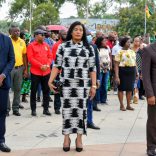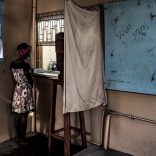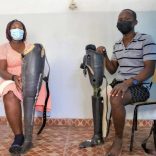Mozambique: Prosecutors must defend legality
In Cabo Delgado “there is shameless abuse of power”

Photo: DW
“We see frequent examples of abuse of power by the police, the army, etc.,” says historian Yussuf Adam, rejecting the idea that the abuses might be accidental.
The recent successful actions by the Mozambican authorities against insurgents in the northern province of Cabo Delgado are the result of interventions by private South African security services. But not everything has gone well in the agreements between mercenaries and their contractors. We talked about this topic and other subjects with Mozambican historian Yussuf Adam.
DW Africa: South African mercenaries have in principle resumed operations in northern Mozambique, after stopping for alleged non-payment by the Mozambican authorities. Does this reveal a certain amateurism on the part of the government in dealing with the insurgency in Cabo Delgado?
Yussuf Adam (YA): No. I don’t think we will know the truth about the subject anytime soon. But, as far as I was able to ascertain, they went on strike for lack of payment, but we do not know who is paying them – we do not know if their contract was with the Mozambican government, and if it was the government that paid them.
DW Africa: Did the stoppage which allegedly took place affect the continuity of the offensive that the government has embarked on recently?
YA: No, in war there are no strong or weak offensives – this only exists in propaganda. War is something that is made every day. I think that the Defence and Security Forces (FDS) or the Ministry of Defence, etc., has a policy of responding to this conflict, but the responses are never the ideal ones. You need to have the material, people and money. I think that the Ministry of Defence budget [is not large], the Ministry of Defence is not very robust, as neither is the Mozambican state budget. We must never forget that we live on donations to a large extent, on external aid and on dreams that one day we will have a lot of money coming out of the oil wells, which until now has failed to materialise. Now, if this offensive is going to continue, yes, it will have to continue; both sides have their strategies and policies. As for interpretations of whether this is a tribal war, I think it is not. It is basically a problem of state policies and the way in which a large part of the population has been marginalised in terms of access to the cake and the economic and social benefits that have perhaps arrived.
DW Africa: After several criticisms about the lack of communication between the government and the people about the situation in Cabo Delgado, the authorities have finally established a communication channel. Will this put an end to the misinformation and the tendency for rumours to spread?
YA: The communiqué lists the sites that were attacked and appeals to the people, and especially the young people, to believe and participate in this fight. But at the same time, last week there was, and the President acknowledged that, a kind of involuntary abuse of power. But abuses of power are not involuntary. It was in Pemba, but it happens all the time in all district capitals, [administrative] posts, on the roads, where we see frequent examples of abuse of power by the police, the army, etc. When Bilibiza was attacked, soldiers beat young people on the road and even filmed and broadcast the videos themselves. This only proves that there is shameless abuse of power.












Leave a Reply
Be the First to Comment!
You must be logged in to post a comment.
You must be logged in to post a comment.